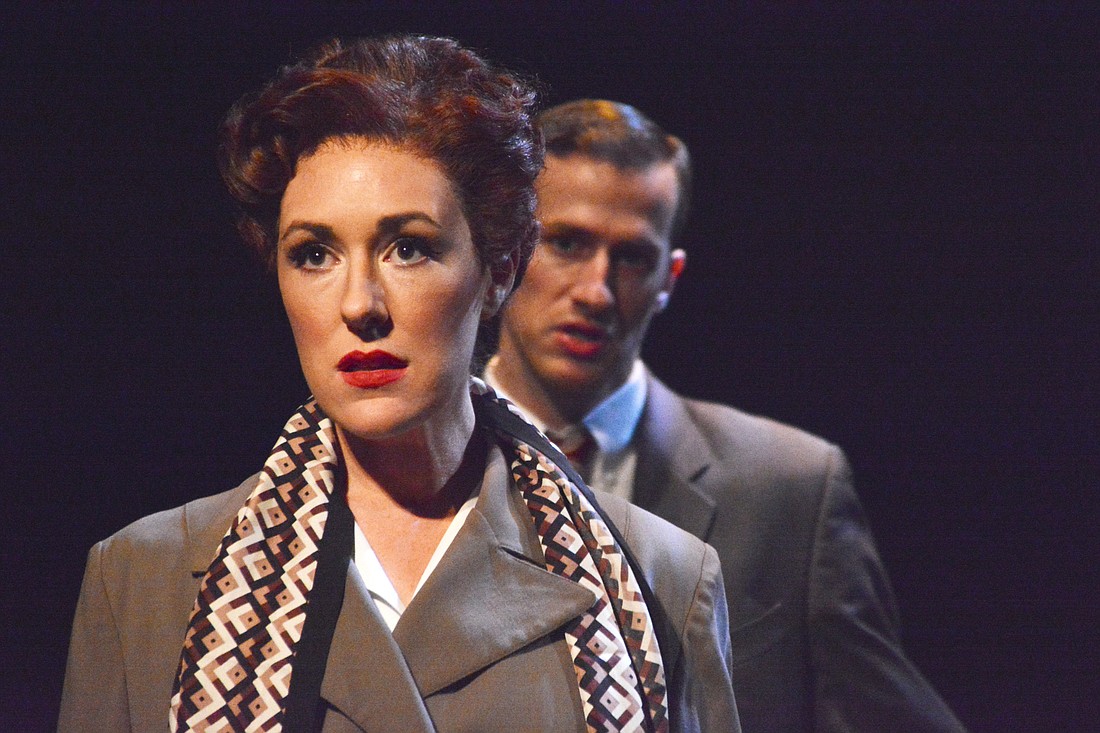- May 23, 2025
-
-
Loading

Loading

The road to hell is paved with insurance fraud. David Pichette and R. Hamilton’s “Double Indemnity” follows that road in Dog Days Theatre’s final summer production. You might think you know the story, but think again.
If your knowledge derives from director Billy Wilder’s 1944 film-noir adaptation, you’re misinformed. Raymond Chandler’s sizzling script took liberties with the source material. James M. Cain’s hard-boiled novel was a different animal; Pichette and Hamilton’s play is a faithful adaptation.
Here’s the real story: Walter Huff sells insurance in 1940s Los Angeles. He visits the home of oilman Herbert Nirlinger (Don Walker) to pitch a policy. Herbert’s away, but his wife, Phyllis (Katie Cunningham), is happy to talk. The air is thick with sexual chemistry; the chat is all about Herbert’s insurance needs. Specifically, accident insurance …
Walter sees right through her. You plan to kill your husband and collect the money, right? Phyllis admits it. Like the ace salesman he is, Walter proposes a policy that’ll pay off double if Herbert dies an unlikely train accident. Which they’ll arrange as quickly as possible.
They do, sooner rather than later. Helpful Herbert conveniently breaks his leg before his Sanford University class reunion. The poor sap can’t drive, so Phyllis drives him to the train station. Walter hides in the back seat and chokes him to death before he arrives. At the station, Walter impersonates Herbert, boards the train, and leaps off at a prearranged point. After that, he helps Phyllis drag the oilman’s corpse on the tracks. (To make it look like Herbert fell from the train, see?)
The killer couple drives off in one car. They squabble and split up. Phyllis hits the drug store for ice cream and an alibi. Walter speeds home, but he can’t outrun his conscience. He can’t even pray.
Back at the insurance company, Walter’s mentor (Douglas Jones) thinks there’s something fishy about the case. Suicide? Nah. This has to be murder. And now Walter starts to sweat.
The play moves from the machinations of murder to a Dostoevskian meditation on crime and punishment. Walter’s uneasy conscience finds him guilty long before the state of California does.
Co-directors Greg Leaming and Jesse Jou do a fine job with this immorality play. They try to stay out of Wilder and Chandler’s long shadow. They can’t, because “Double Indemnity” is Walter’s posthumous, first-person narrative. The script owes an obvious debt to Wilder’s “Sunset Boulevard,” which proved dead men do tell tales.
Erik Meixelsperger’s Huff is a cool customer — a sharp-dressed, Don Draper-type. Where the movie made Walter a naïf, the Walter of the play thinks he knows the score. The poor sap actually believes the murder scheme was his idea and doesn’t realize Phyllis had been playing him like a cheap fiddle. Cunningham’s Phyllis doesn’t act like a typical femme fatale. She’s a redhead, as opposed to the standard atomic blonde. On top of that, Phyllis talks with an affected, upper-class manner and dresses in restrained, tasteful elegance. That’s all camouflage — Phyllis’ way of putting her prey off-guard and concealing her love affair with death.
Her stepdaughter, Lola, an actual blonde, is a wide-eyed semi-innocent. She suspects her stepmother has blood on her hands but doesn’t know the half of it. Walker’s Herbert is an affable fellow who sees the best in people. In the universe of this play, he doesn’t stand a chance.
Jones’ Keyes has a Peter Falk vibe as an old-pro insurance investigator with shabby clothes and a sharp mind. Kudos also to Mike Perez and Wes Tolman for filling out the characters in the play’s noirish shadows.
And shadows there are.
Steven Kemp’s expressionistic set is free of right angles. (It’s all crooked, in other words.) Stagehands roll in minimal set pieces as needed, including Walter’s favorite chair, which strongly resembles an electric chair. Michael Pasquini’s cold blue lighting creates a world without warmth. His projections resemble prison bars and spider webs without hitting it on the nose.
David Covach’s costumes evoke period and character with neutral tones and muted colors. Add it all up. It’s as close as the stage can get to a black-and-white movie.
The play has flashes of gallows humor. But the road it travels is Dostoyevsky-dark. You experience the sulfuric-acid corrosion of a bad conscience. The end of the road is hellish and hopeless.
If you’re looking for a lighthearted romp, rent “Pee-wee’s Big Adventure” instead.